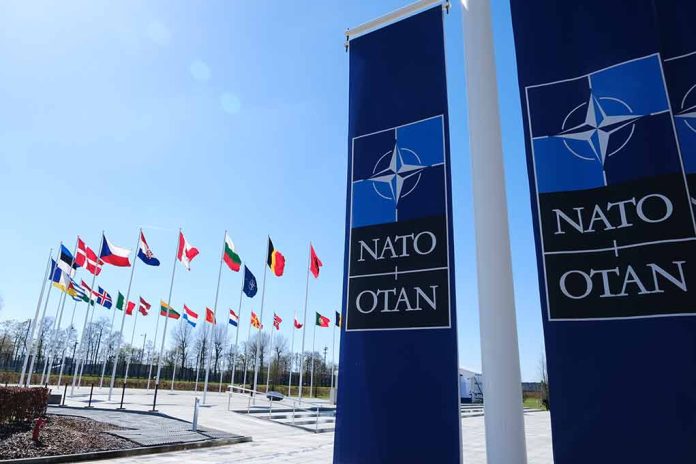
President Trump’s ceasefire proposal collides with Putin’s three-day truce offer and Ukraine’s rejection, revealing dangerous fault lines as Russia threatens severe consequences against Ukraine during May 9 Victory Day celebrations.
Key Takeaways
- Trump proposed a permanent ceasefire plan on April 17 that Ukraine and Europe rejected as too favorable to Russia, while Putin countered with just a three-day pause for Victory Day celebrations
- Russian official Dmitry Medvedev issued an ominous threat that “nobody will be able to guarantee that Kyiv will live to see May 10” if Ukraine provokes Russia during Victory Day
- Zelenskyy dismissed Putin’s three-day ceasefire as a “theatrical show” while advocating for a more substantial 30-day truce
- Ukraine cannot ensure the safety of foreign dignitaries attending Moscow’s May 9 commemoration, heightening international tensions
- Russia continues military operations including drone attacks on Kyiv despite peace discussions, with intense fighting continuing in eastern Ukraine
Trump’s Peace Plan Rejected by European Allies
President Trump’s April 17 ceasefire proposal has created a diplomatic rift between the U.S. and European allies. Trump’s plan conceded significant territory to Russia, including Crimea and parts of Luhansk, Donetsk, Zaporizhia, and Kherson regions. The proposal also denied Ukraine future NATO membership and called for immediate lifting of sanctions against Russia, positions that Ukraine and European leaders find unacceptable. After Russia continued attacks despite peace talks, Trump expressed frustration during meetings with Zelenskyy in Rome.
“If you want the killing to stop, you should put the pressure on Russia, who actually does the killing,” said Kaja Kallas, European Commission President
The Ukraine-European counter-proposal, presented on April 23, suggested deferring territorial negotiations, gradually easing sanctions only after peace is established, and maintaining no restrictions on Ukrainian or allied military presence. US Secretary of State Marco Rubio reportedly withdrew from discussions after this counter-proposal, revealing deepening divides between Washington and Brussels over how to end the conflict that has now entered its fourth year.
Putin’s Three-Day Truce Dismissed as “Theatrical”
Russian President Vladimir Putin announced a unilateral three-day ceasefire from May 8-10 to coincide with Victory Day celebrations marking the 80th anniversary of the Soviet triumph over Nazi Germany. The brief pause in hostilities was immediately rejected by Ukrainian President Zelenskyy, who called it a “theatrical show” rather than a genuine peace effort. Zelenskyy has instead pushed for a more substantial 30-day ceasefire, arguing that meaningful negotiations require a longer pause in fighting.
“We cannot be responsible for what happens on the territory of the Russian Federation. They are responsible for your security, and therefore we will not give you any guarantees,” said Ukrainian President Volodymyr Zelenskyy, regarding the safety of foreign leaders attending ceremonies in Moscow
Despite peace discussions, Russia continues military operations, including launching drone attacks on Kyiv that have caused fires in residential areas. Intense fighting persists in eastern Ukraine, particularly around Pokrovsk in the Donetsk region. Russia has claimed to have expelled Ukrainian forces from Kursk with North Korean military assistance, an alliance that North Korea has officially acknowledged. These continuing hostilities undermine confidence in Russia’s commitment to any ceasefire proposals.
Medvedev’s Chilling Threat Against Ukraine
Dmitry Medvedev, deputy chairman of Russia’s Security Council and former president, issued one of the most direct threats yet in the conflict, warning that Kyiv might not survive if Ukraine attacks during Victory Day celebrations. His statement came after Zelenskyy declined to provide security guarantees for foreign leaders attending Moscow’s May 9 commemoration. The menacing rhetoric has heightened fears of a significant escalation around the symbolic date.
“(Zelenskyy) understands that in the event of a real provocation on Victory Day, nobody will be able to guarantee that Kyiv will live to see May 10,” said Dmitry Medvedev, Deputy Chairman of Russia’s Security Council
The Czech Republic has joined the peace efforts, with President Petr Pavel supporting increased pressure on Russia for a longer ceasefire. During Zelenskyy’s visit to the Czech Republic, Pavel emphasized that Putin alone holds the power to end the conflict. “If someone has all the cards in their hand to end the war then it is President Putin, who can do it with a single decision,” said Czech President Petr Pavel. Russia, meanwhile, continues expanding its military presence along borders with the EU and NATO, particularly near Finland.







